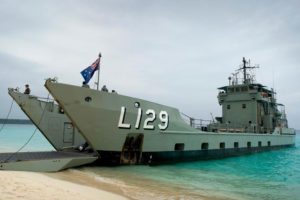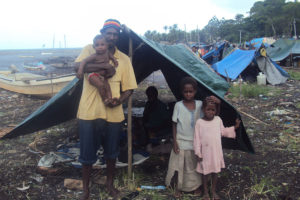When one hears the term ‘security’ images of James Bond spring to mind with threats to the state, thoughts of terrorism and concern about escalating conflicts between nations.
But we need to take a much broader holistic approach to security, says CSIRO’s Dr James Butler.
“Security is about the threats to the well-being and equality of humans,” he says, “which are linked to security dilemmas that arise in the balancing of power.”
Climate change affects regional security
It is within this broader security framework that
For example, Cyclone Pam in Vanuatu in 2015 was one of the most extreme cyclones ever experienced in the region.
“The impacts of such climate change disasters can be population displacement as people in rural areas move to the cities, or it can even lead to local conflicts over limited resources such as food and water,” says Dr Butler.
But climate change can also have indirect impacts on security and Dr Butler points to the possible links between global droughts and floods, poor wheat harvests, rising food prices and the Middle East civil uprisings during 2010 to 2012.
Professor Admiral Chris Barrie, also speaking at the conference, agrees on the importance of considering climate within defence priorities. “How can we best respond to natural disasters,” he asks. “And what happens if two to three extreme events take place at the same time?”
Climate change as a threat multiplier
It is the combination of various threats that Dr Butler believes could trigger security crises in the Pacific region.
“In these situations,
The PNG drought followed other droughts in 1914, 1941 and 1997, but the return of drought to the region happened much more quickly than expected.
It happened at the same time that PNG was trying to deal with other issues such as a rapidly growing human population, deteriorating roads and other infrastructure, weak governance, a collapse in national revenue from gas, and rising unemployment.
“Ten per cent of PNG’s population, or 770,000 people, were affected by food and water shortages during this drought,” says Dr Butler. “The remote areas of the rugged highlands and small offshore islands were the most affected.”

The drought brought many secondary problems to PNG, which escalated security issues. These included rising food and fuel prices, tuberculosis and cholera outbreaks, closing schools, increasing theft, rising migration to urban areas and illegal fishing in the Torres Strait.
Chris Barrie believes it is issues like this that make it imperative for Australia’s defence force to “mainstream climate change plans with defence priorities.”
“We need to enhance our disaster relief abilities, and we need to be prepared and have the capacity to deal with such crises,” he says.
James Butler agrees and makes three propositions where Australia and New Zealand could lead in addressing Pacific climate change security threats.
Proposition 1: Identify the hotspots
“Firstly, we need to identify the hotspots where we can expect future security crises,” he says. “These are places that are already facing stresses from a number of different angles, and extreme climate events could create a ‘perfect storm’.”
Dr Butler believes the information already exists to identify hotspots based on an analysis of a place’s vulnerability to sea level rise and extreme weather events, population growth and density, extent and quality of infrastructure, availability of natural resources, governance, and politics.
“We need to identify these hotspots now,” he says. “Prevention is far cheaper than a cure.”
Dr Butler suggest two hotspots as being the Torres Strait, where Australia and PNG both have sovereignty, and the border zones between PNG and Indonesian provinces of Papua and West Papua.
Proposition 2: Make management agreements over shared resources more adaptable

“There are already conflict and security issues in areas where declining resources are shared between nations, provinces and communities,” he says.
“My second proposition is that we must work with the countries and communities involved to make sure that existing management agreements are much more adaptable and can anticipate and act on future pressures and shocks.”
The 1975 Torres Strait Treaty between Australia and PNG was novel when it was set up, but it now needs to be updated and become more flexible, suggests Dr Butler.
“It is probably not flexible enough to deal with rapid and unprecedented change, and the likely increase in people movements and use of declining resources.
“It needs to become an adaptive learning structure where different types of knowledge – local and scientific – can be integrated to tackle unprecedented problems.
“This requires a different mindset where everyone is involved in identifying the issues and adjusting their behaviour, knowledge and attitudes.”
Proposition 3: Act to support hotspot areas now before a crisis happens
The third proposition that Dr Butler outlines is the need to focus on the simultaneous stresses that lead to a crisis, rather than waiting for a crisis to happen.
“This is about building resilience in communities,” he explains. “And it is also about targeting our aid in a more strategic way to those hotspot areas.”
But for countries like PNG, there is no time to waste in making these propositions a reality.
“We will see big changes in PNG in the next 20 years. We need to start addressing the hotspots within PNG, and the stressors in these areas, now.”
